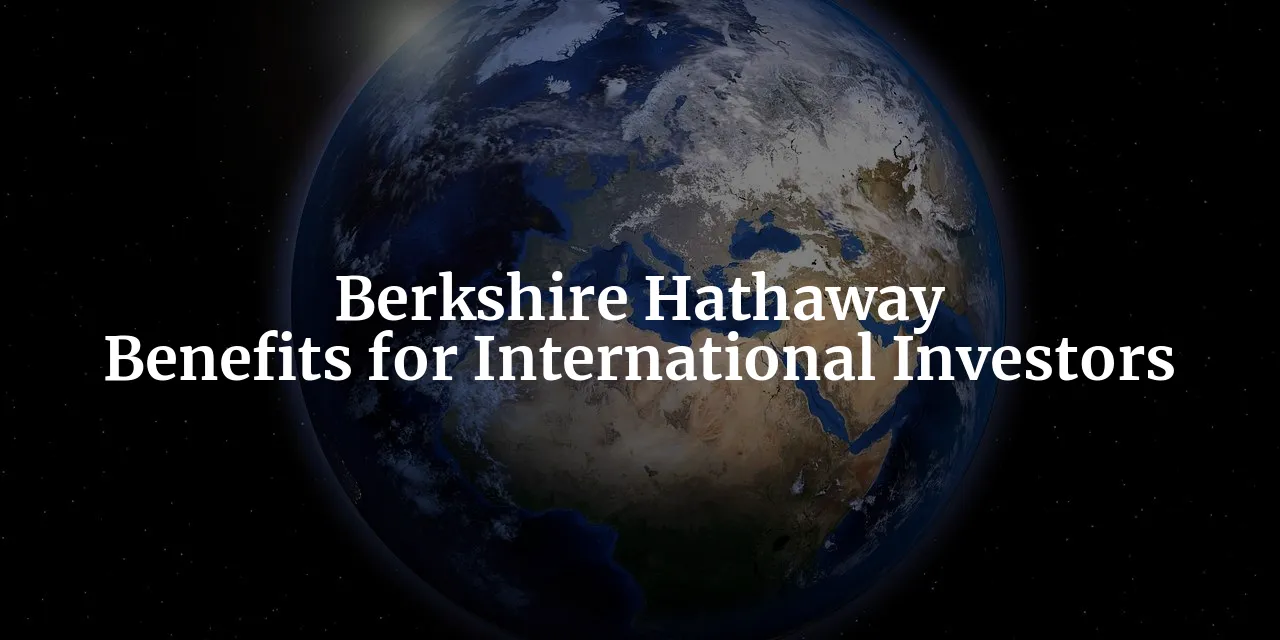Tags: Taxation
This fanpage is not officially affiliated with Berkshire Hathaway: Disclaimer

Introduction: Beyond the Surface of a Financial Titan
Berkshire Hathaway is often hailed as a paragon of value investing, a reputation forged through its consistent performance and sage leadership. While the general reasons for its acclaim are widely recognized, it's worth delving deeper into these attributes:
- Diversification: With a portfolio encompassing insurance, energy, retail, and manufacturing, Berkshire Hathaway exemplifies the strategic advantage of diversification. This not only mitigates the risks associated with single-sector investments but also positions the company to capitalize on opportunities across a broad economic spectrum.
- Astute Leadership: At the helm, Warren Buffett and Charlie Munger have become almost synonymous with investment acumen. Their stewardship has steered Berkshire Hathaway towards remarkable shareholder value creation. Complementing their vision is a cadre of seasoned managers, each contributing to the firm's expansive growth.
- Robust Financials: The company's balance sheet is a fortress, buttressed by substantial cash reserves that afford strategic acquisitions and investments. In volatile economic climates, this financial resilience acts as a bulwark, safeguarding the company's interests.
- Long-Term Orientation: Eschewing the myopic chase for immediate profits, Berkshire Hathaway's investment philosophy is firmly rooted in the long term. This forward-looking approach has been instrumental in the company's enduring success.
- Unwavering Integrity: Perhaps the cornerstone of Berkshire Hathaway's corporate ethos is its unwavering commitment to integrity and ethical conduct. This dedication resonates with customers and investors alike, fostering a climate of trust that is invaluable in business.
The emphasis on integrity cannot be overstated, and it's worth noting that Berkshire Hathaway is highly unlikely to engage in dubious financial reporting or venture into ethically questionable enterprises. Despite Charlie Munger's widely publicized skepticism of assets like Bitcoin, the company's guiding principles remain steadfast.
My wealth has come from a combination of living in America, some lucky genes, and compound interest.
However, our focus today transcends mere accolades for Berkshire Hathaway. Instead, we aim to unravel the specific advantages that owning Berkshire shares presents to non-US investors—a subject that, despite its significance, often eludes common investor knowledge. Let's embark on this journey of discovery.
The Comparative Edge for Non-US Investors: Berkshire Hathaway vs. US Dividend Securities
For the discerning international investor, the choice between Berkshire Hathaway and other US securities demands a nuanced understanding of tax implications and growth potential. Let's juxtapose Berkshire against two prevalent investment choices: an S&P 500 index fund and a typical dividend-paying stock.
The Allure and Complexity of Dividend Investing
Dividend investing has garnered immense popularity, propelled by the promise of passive income. In the US, this investment strategy is particularly attractive due to favorable tax treatment, with effective dividend tax rates hovering near zero for incomes up to approximately $41,000 for individuals and $83,000 for married couples nerdwallet.
However, the landscape shifts dramatically for non-US investors. Dividends from US securities are subject to a withholding tax of 30%, reduced to 15% for countries with a tax treaty with the US, such as Germany nerdwallet. Consequently, non-US investors face a layered tax burden that diminishes returns.
Consider corporate bonds if you're seeking cash flow from investments. Unlike dividends, which are typically paid after taxes, interest on bonds is treated as a company expense. This makes it more cost-effective for a company to pay $10 in interest than a $10 dividend.
The Tax Dynamics of Dividend Stocks and Index Funds
For a non-US investor, dividends from a US stock could be taxed at an effective rate of 25%, factoring in both US withholding tax and German capital gains tax. This rate could slightly increase due to additional taxes, leading to a potential tax hit of around 26%.
Index funds complicate matters further. The US withholding tax also applies to dividends within a fund, and additional taxation may occur depending on the fund's domicile. However, an index fund domiciled in Ireland can offer tax efficiencies due to Ireland's favorable tax treaty with the US and absence of Irish withholding tax link.
The Investment Scenario: Post-Dividend Season Valuation
Imagine a scenario where Berkshire B shares, a hypothetical "Dividend Champion" stock, and an a 2% dividend yield for the latter two and no dividends for Berkshire, let's assess the post-dividend season value:
- Berkshire: $100 (no change as no dividends are distributed)
- Dividend Champion: $99.47 (after accounting for taxes and currency exchange)
- Ireland-domiciled S&P 500 index fund: $99.38 (after accounting for taxes and currency exchange)
This simplified example excludes index fund fees for clarity but highlights the tax inefficiencies for non-US investors in dividend-yielding securities. Even a seemingly modest dividend yield can lead to significant value erosion due to cross-border taxation.
The Compounding Effect of Tax Efficiency
While the loss of 0.5% to 0.6% in value due to taxation may appear trivial at first glance, the long-term impact is far from negligible. The power of compounding interest means that these seemingly small percentages can translate into substantial differences in investment growth over time.
In this context, Berkshire Hathaway's strategy of reinvesting earnings rather than distributing dividends aligns seamlessly with the tax considerations of non-US investors. By avoiding the tax drag associated with dividends, Berkshire offers a potentially more tax-efficient vehicle for long-term wealth accumulation.
For Berkshire there are even more reasons to retain the dividends other than for non-US investors paying taxes. You may like the following interview with Warren Buffett on the topic:
In the following sections, we will delve deeper into the mechanics of Berkshire Hathaway's growth strategy and how it can serve as a strategic asset for international portfolios seeking to maximize after-tax returns.
The Mechanics of Berkshire Hathaway's Growth Strategy
Berkshire Hathaway's approach to growth is fundamentally different from companies that prioritize dividend payouts. Instead of distributing profits to shareholders, Berkshire reinvests earnings into its diverse portfolio of businesses and strategic acquisitions. This reinvestment strategy has several key components:
Reinvestment in Existing Operations
Berkshire Hathaway continually seeks to improve the efficiency and profitability of its wholly-owned subsidiaries. By reinvesting in these businesses, the company aims to enhance their competitive edge and generate higher returns over time.
Strategic Acquisitions
Warren Buffett and his team are renowned for their ability to identify and acquire companies at attractive valuations. These acquisitions are meticulously chosen to align with Berkshire's long-term investment philosophy and to complement its existing portfolio.
Marketable Securities
Berkshire Hathaway maintains a significant portfolio of marketable securities, including substantial stakes in blue-chip companies. The selection of these investments is based on the intrinsic value of the companies and their potential for long-term appreciation.
Cash and Cash Equivalents
Berkshire Hathaway's strategy also involves maintaining a robust cash position to capitalize on market opportunities as they arise. This liquidity allows the company to make substantial investments without the need for external financing, especially during market downturns when assets may be undervalued.
Berkshire's cash pile ↗ might also be used to perform share buybacks to gain shareholder value in the long run ↗.
Berkshire Hathaway as a Strategic Asset for Non-US Investors
For non-US investors, Berkshire Hathaway's growth strategy offers several strategic advantages:
Tax Efficiency
As previously discussed, Berkshire's policy of not paying dividends translates into a tax advantage for non-US investors, who would otherwise be subject to withholding taxes and potential double taxation on dividends.
Exposure to a Diversified Portfolio
Investing in Berkshire Hathaway provides international investors with exposure to a broad range of sectors and businesses without the need to construct and manage a diversified portfolio themselves.
Currency Diversification
Non-US investors also benefit from currency diversification, as Berkshire's assets and earnings are primarily denominated in US dollars, providing a hedge against local currency depreciation.
Stability and Reliability
Berkshire Hathaway's reputation for stability, conservative financial practices, and strong corporate governance makes it an attractive option for investors seeking a reliable investment in uncertain economic climates.
Potential for Capital Appreciation
The company's focus on long-term capital appreciation, rather than short-term income distribution, aligns with the goals of investors who prioritize wealth growth over immediate income.
Hence, Berkshire Hathaway's unique growth strategy and its implications for tax efficiency make it a compelling choice for non-US investors. By avoiding the tax drag of dividends and leveraging the company's reinvestment approach, international investors can potentially enjoy superior long-term returns.
Summary: Embracing Berkshire Hathaway's Unique Investment Appeal
In our exploration, we've revisited the universally acknowledged reasons that make Berkshire Hathaway a sterling investment choice, particularly for value-oriented investors. The company's robust diversification, astute management, financial fortitude, long-term investment strategy, and unwavering commitment to integrity collectively underpin its status as an investment powerhouse.
Delving into the specifics, we've unpacked the tax ramifications for non-US investors when it comes to dividend-yielding US securities. Through a straightforward example, we've illuminated the stark reality that dividend distributions can erode equity for those subject to US withholding taxes and their own nation's capital gains taxation.
Berkshire Hathaway stands out for its distinctive policy of reinvesting profits rather than distributing dividends. This approach not only aligns with Warren Buffett's investment philosophy but also presents a strategic tax advantage for non-US investors, sparing them from the double whammy of taxation and allowing their investments to compound unfettered.
Beyond tax considerations, Berkshire Hathaway's reinvestment strategy offers a gateway to a diversified and meticulously curated portfolio, currency diversification, and the promise of capital appreciation—all while maintaining a conservative and stable financial profile that resonates with investors globally.
In conclusion, the confluence of Berkshire Hathaway's growth-centric model, its tax-efficient approach to earnings, and its enduring corporate ethos renders it a particularly attractive investment vehicle for non-US investors. By opting for Berkshire Hathaway, international shareholders can partake in the company's financial successes while mitigating the tax inefficiencies that often accompany cross-border dividend investments.
Berkshire Hathaway's track record speaks volumes. The company's strategic decisions and financial results over the decades stand as testament to its effectiveness in creating and sustaining shareholder value. For non-US investors seeking to optimize their portfolios while navigating the complexities of international taxation, Berkshire Hathaway offers a compelling blend of growth potential and tax efficiency, making it a venerated choice in the global investment landscape.







